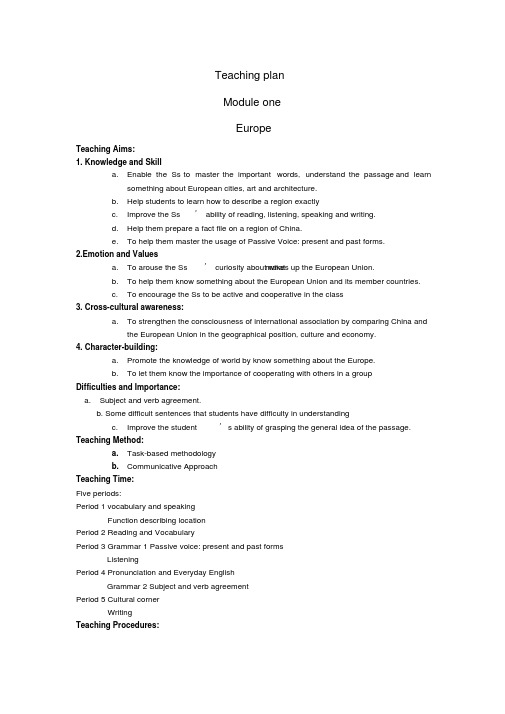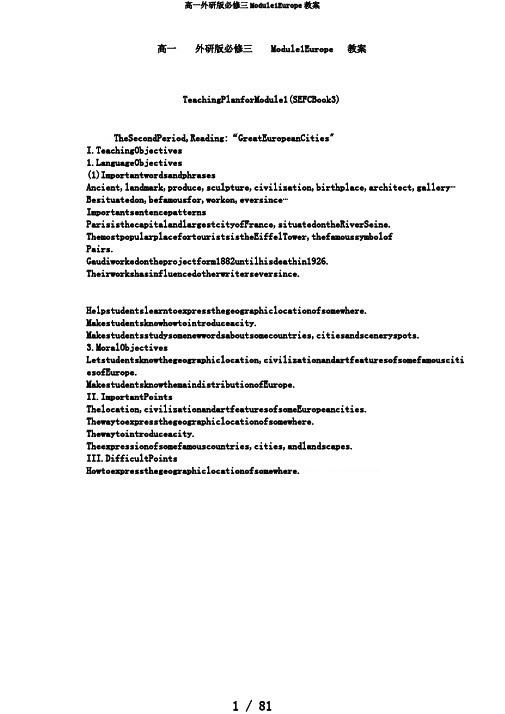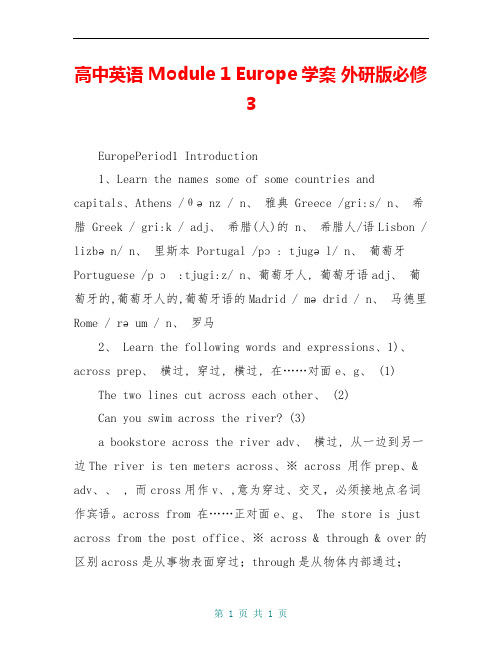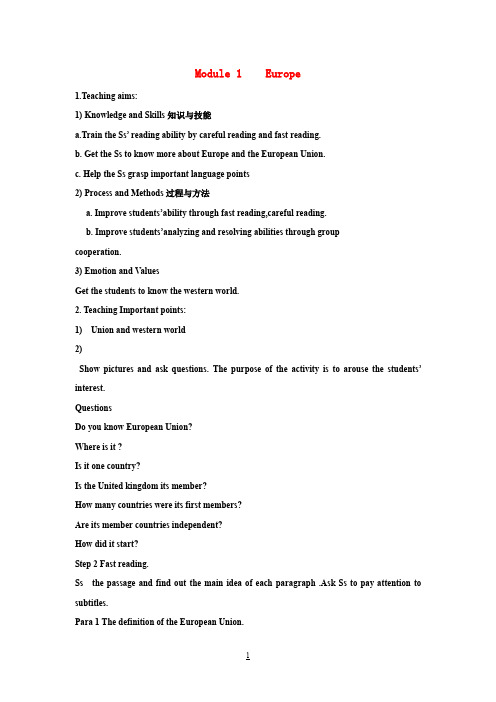英语必修ⅲ外研版module1europe教案period3
高中英语 Module 1 Europe学案外研版必修3

高中英语 Module 1 Europe学案外研版必修3Europe Period1 Introduction Teaching aims:1、Words connected with page1 -22、 Oral English about describing locationTeaching process: Ⅰ、 vocabulary 横过;穿过_________ boot _______ 大陆的;大洲的__________ face v、_______range______________ 建筑性建筑_________ 美术馆____________ symbol _________坐落于_______________ 建筑师_____________ project _______________sculpture____________ 发源地_____________ civilization_________ 古代的____ Ⅱ、presentation1、Have you ever traveled to any places? Where is it ?2、If I give you a chance to travel overseas, wheredo you want to travel most? And why?(let students tolearn to know the usage of “in” “on” “to”、)①、Alies____ the south ofB、② C is located ___the south ofD、/ C is located ____ the coast of D③、 E is situated ____ the south of F、/ E is situated ___ thecoast of F、( off the coast of 指在离陆地不远的海上 On the coast of 指在海岸线上的陆地上)Ⅲ、part1 on page1 Ⅳ、part2 on page2Exercises:1、There is a c_________ climate in that place、2、用 across 、through 、over 填空The Great Wall winds its way from west to east _______ the deserts ______ the mountain and ________ the valley until it reaches seas、3、 He lives in a small house ______ (面向)a park、4、 A dove(鸽子)is the s________ of peace、5、 There are some small islands ___ the coast and several villas(别墅)___ the coast ,too、( off\on )6、 A rainbow appeared in the sky、(同义句转换)In the sky _____________________、7、看起来像_____________8、山脉__________9、被覆盖____________ Book3 Module1 Europe Period3 Reading Ⅰ、phrases1、位于___________2、80亿游客___________________3、因。
高一英语Module1《Europe》教案(外研版必修3)

Teaching planModule oneEuropeTeaching Aims:1. Knowledge and Skilla.Enable the Ss to master the important words, understand the passage and learnsomething about European cities, art and architecture.b.Help students to learn how to describe a region exactlyc.Improve the Ss’ ability of reading, listening, speaking and writing.d.Help them prepare a fact file on a region of China.e.To help them master the usage of Passive Voice: present and past forms.2.Emotion and Valuesmakes up the European Union.a.To arouse the Ss’ curiosity about whatb.To help them know something about the European Union and its member countries.c.To encourage the Ss to be active and cooperative in the class3. Cross-cultural awareness:a.To strengthen the consciousness of international association by comparing China andthe European Union in the geographical position, culture and economy.4. Character-building:a.Promote the knowledge of world by know something about the Europe.b.To let them know the importance of cooperating with others in a groupDifficulties and Importance:a. Subject and verb agreement.b. Some difficult sentences that students have difficulty in understandingc.Improve the student’s ability of grasping the general idea of the passage. Teaching Method:a.Task-based methodologymunicative ApproachTeaching Time:Five periods:Period 1 vocabulary and speakingFunction describing locationPeriod 2 Reading and VocabularyPeriod 3 Grammar 1 Passive voice: present and past formsListeningPeriod 4 Pronunciation and Everyday EnglishGrammar 2 Subject and verb agreementPeriod 5 Cultural cornerWritingTeaching Procedures:。
高中英语 Module 1 Europe教案 外研版必修3

Module 1 EuropeMy fantastic trip to Spain【美文导读】充满惊喜的西班牙之旅让Anna忍不住把所遇到的奇闻轶事都写信告诉她的好朋友Laura。
我们也一起来分享一下她的快乐旅程吧!Dear Laura,Here I am in Granada,Spain!Can you believe it?I'm sitting in a park near the house I'm staying in. The weather is beautiful! The sun is shining and it's just beginning to get warm.My host mother Rosa is very nice.She's much younger than I expected,and she lives with her fiveyearold son Borja.He's so cute! Julie and I are staying in her apartment,along with two French girls and a boy from Michigan.The apartment is pretty crowded, but luckily I don't have to spend too much time there.I've spent the past few days exploring the town with Lauren and Caitlin.Yesterday we went to the Alhambra(西班牙格拉纳达的摩尔人王宫),which was one of the most amazing things I've ever seen.It's a huge fortress(要塞) built hundreds of years ago by the Muslims(伊斯兰教徒) who once lived in Granada.There are gardens and fountains and intricate carvings all through the fortress.It's huge -I could have spent days in there!That night we went to see flamenco dancing(弗拉曼戈舞). I loved it!You should have seen the way those dancers moved.After that, we went to dinner in the central square.The food here is pretty good—they have lots of “tapas,”which means appetizers(开胃菜).It's great to be visiting a foreign country whose language I actually speak. It's hard though,because whenever I have to talk to people I get nervous and forget everything.My Spanish is definitely getting better,though.I had a great conversation with my host mother yesterday.We talked about politics, and it was so interesting to hear about her views. That's what I love about language:it allows people from completely different backgrounds to communicate with one another and to begin to understand each other.I love the culture here.The best part is the “siesta(午睡)”.Every afternoon,the shops close and everyone goes home to eat lunch and take a nap(小睡).Then,they go back to work feeling completely refreshed! It's wonderful.I also love the fact that you can walk everywhere.Lauren,Caitlin,and I are planning on going to the beach this weekend.It's supposed to rain,but I hope it doesn't!We also want to go horse riding in the mountains.I can't wait.I'll be sure to write again soon! I miss you.Much love,Anna 【诱思导学】1.Do you want to go to Spain after reading the letter? List the reasons (at least two).【答案】 Yes.Visiting the amazing thing the Alhambra; enjoying the wonderful food and flamenco dancing; practicing Spanish, etc.2.Do you have a nap after lunch? What do you think of the siesta?【答案】Yes. After a nap(siesta), I can get down to my work feeling completely refreshed.Period ⅠPreviewing(教师用书独具)●教学目标本课时主要是通过学生对学案所给出的内容的学习,了解本课文中所出现的词汇,初步了解课文以及相关的背景知识,对下一堂课对课文的全面理解起到一个铺垫作用。
英语ⅲ外研版module1europe教案period3

英语ⅲ外研版module1europe教案period3整体设计教材分析本节为语法课,学习被动语态和句子中的主谓一致,教师通过讲解和练习,关心学生解决英语学习中的难点,培养抽象思维能力。
动词的语态要紧分为两种:主动语态和被动语态。
主动语态是指主语是谓语动词的执行者,二者为主动关系。
被动语态是指主语是谓语动作的承受者,二者为被动关系。
主谓一致指的是句子的谓语动词与其主语在数上必须保持一致,句子的主语是第三人称单数,主语是复数,那么谓语动词用复数。
三维目标1.知识与技能1)Helpstudentsrevisethesubjectandverbagreement.2)Helpstudentsrevisethepassivevoiceinthepresentandpastforms.3)Makethemmastersomegrammaticalrules.2.过程与方法1)Motivatestudents’enthusiasmintakingpartinclass.2)Individualworkandpairworktomakeeverystudentworkinclass.3.情感与价值Throughthestudyofthisperiodstudentswillsurelyknowmoreaboutthepassivevoiceas wellasthesubjectandverbagreement,sothattheyareabletocomeupwithidiomaticEnglish.教学重点1.Encouragestudentstosumupgrammaticalrulesthemselves.2.Encouragestudentstoapplythegrammaticalrulestopractice.教学难点Alltypesofthesubjectandverbagreement.教学方法1.Deduction.2.Practice.教学过程→Step1RevisionRevisewhatwehavelearnedlastclass.1.Makestudentsdiscussinpairstocompletethefollowingtable.(Showthefollowingonthescreen.)Famousplace(s)inthecity OtherspecialfeaturesCity’sname CountrythecitybelongstoParis France EiffelTower,theLouvre Restaurants,cafésandtheatres,famouswriters Barcelona Spain TheSagradaFamilia /Florence Italy TheUffiziPalace FamousforRenaissance,greatestpaintersAthens Greece TheParthenon Thebirthplaceofwesterncivilisation,bestwriters2.Encouragestudentstochooseacityfromthetableandintroduceittothewholeclassus ingtheinformation.→Step2Grammar1:PassiveVoice1.AskstudentstoreadthroughthesentencesinActivity1,Page5andthendiscusswiththeirpartnerthefollowingquestions:1)Whatdoestheword“by”inthefirstthreesentencestellyou?2)Isthereanydifferenceinmeaningbetweenthesetwosentences?Parisisvisitedbymorethaneightmilliontouristseveryyear.MorethaneightmilliontouristsvisitPariseveryyear.3)Whyistheword“by”notinthesentencesdande?(Afterafewminutes’discussiontheteachermayaskstudentstoanswerthequestions) Suggestedanswers:1)Ittellsuswhodidtheaction.(Ingrammaticalterms:Ittellsuswhotheagentwas.)2)Thefocusisdifferent.InthefirstsentenceitisPariswhichthatismoreimportant;w hileinthesecondonewearemoreinterestedinthetourists.3)Insentenced,becauseweunderstandthatitmeans“isknownbyeveryone”,andtheinclusionoftheagentwouldbesuperfluous,whileinsentenceebecausewearenotinterestedinwhobuil tit.2.OptionOneEncouragestudentstosumupthestructureofPassiveVoice.Taketheverb“do”asanexample.Writethefollowingontheblackboardandgivethemafewminutestocompletethetable.时态主动语态被动语态一般现在时do/does am/is/are+done一般过去时did was/were+done现在进行时am/is/are+doing am/is/are+being+done过去进行时was/were+doing was/were+being+done现在完成时have/has+done have/has+been+done过去完成时had+done had+been+done一般今后时will+do will+be+done过去今后时would+do would+be+done OptionTwoShowthegrammaticalrulesonthescreenandhavestudentsmakesenseofthem.被动语态的结构一般来说,只有需要动作对象的及物动词(短语)才有被动语态。
高一外研版必修三Module1Europe教案

高一外研版必修三Module1Europe 教案TeachingPlanforModule1(SEFCBook3)TheSecondPeriod,Reading:“GreatEuropeanCities〞I.TeachingObjectivesnguageObjectives(1)ImportantwordsandphrasesAncient,landmark,produce,sculpture,civilization,birthplace,architect,gallery⋯Besituatedon,befamousfor,workon,eversince⋯ImportantsentencepatternsParisisthecapitalandlargestcityofFrance,situatedontheRiverSeine. ThemostpopularplacefortouristsistheEiffelTower,thefamoussymbolofPairs.Gaudiworkedontheprojectform1882untilhisdeathin1926. Theirworkshasinfluencedotherwriterseversince.Helpstudentslearntoexpressthegeographiclocationofsomewhere. Makestudentsknowhowtointroduceacity. Makestudentsstudysomenewwordsaboutsomecountries,citiesandsceneryspots.3.MoralObjectivesLetstudentsknowthegeographiclocation,civilizationandartfeaturesofsomefamousciti esofEurope.MakestudentsknowthemaindistributionofEurope.II.ImportantPointsThelocation,civilizationandartfeaturesofsomeEuropeancities. Thewaytoexpressthegeographiclocationofsomewhere.Thewaytointroduceacity.Theexpressionofsomefamouscountries,cities,andlandscapes.III.DifficultPointsHowtoexpressthegeographiclocationofsomewhere.Howtointroduceacitysimply.IV.TeachingMethodsReading,skimming,scanning,discussing,(AskingandAnswering,pictures,Groupwork,Explaining⋯) 2.TeachingAids:Multimediafacilities,photos,diagrams ⋯Guys,doyouliketravel?S:Yes.Wheredoyouwanttogo?France,ItalyOh,metoo.Franceisromanticandtheyarebeautiful!OK,now,Iwillshowyousomepicturesaboutsomescenicspots.Pleaselookatthescreen.ThefirstoneisProvence.Canyoutellmewhereisit?S:France.T:Good.ItisinFrance.Provenceisfamousforit’slavenderfarm.Justliketheflowerofpurpleinthispicture.ThesecondoneisCinqueTerre.ItisinVenice.ItisanItaliancity.CinqueTerreisformedof5smallvillages.Allofthemhavetheirownspecialcharacters.Theyarebeautiful.ThenextisSantorin.ItisclosetoAthens,acityinGreece.SantorinisanislandinAegeanSea.Thebuildinginthisislandislikethepictureshowstoyou.Themaincoloriswhiteandblue.OK,thepicturesareover.Haveyoufoundthecommonfeaturesfromthosepictures.Youcanthinkaboutitaccordingtoit’scountries.AllofthemareinEurope.Excellent.Inthosepictures,IhaveshowedyouFrance,ItalyandGreece.Allofthem AreinEurope.Sotoday,wewilllearnsomecitiesin Europe.Ourtopicis“GreatEuropeanCities〞.StepIIPre-reading(3mins)T:First,letuslearnsomenewwords.Lookatthescreen.AncientGreeceandancient Rome.Canyouguessthemeaning?S:古希腊,古罗马T:Welldone!Sothemeaningofancientis“古老的〞l ookattheexample.“Someancienttownshavewallsaroundthem“.it’smeaningis“有些古老的城市周围有城墙〞Thenext.TheEmpireStateBuildingisafamiliarlandmarkin NewYork.It means“帝国大厦是纽约的标志性建筑〞Sothemeaningof“landmark〞is“标志性建筑,地标〞Thethirdoneis“theChinesecivilizationisoneofthe oldestintheWorld.It’smeaningis“中国文化是世界上最古老的文化之一〞Sothe meaningof“civilization〞is“文化〞OK,It’sover.Haveyougotit?Yes.OK,let’smoveontothenextstep.Fastreading.StepIIIFast-reading(5mins) Letstudentsreadthewholepassagequickly,thenfinishtheactivity1. Nowpleaseskimthewholepassageandthenfinishactivity1onpage2.Matchthosesentenceswithpicturesandtellmewhichparagraphitbelongsto.Clear?Yes.4minutesforyou.Now,goahead.OK,time’sup.Anyvolunteer?(1).AlandmarkinParis(2).AnartgalleryinFlorence(3).AchurchinBarcelona(4).AbuildinginAthensEiffelTower UffiziPalaceParthenon D.TheSagradafamiliaStepIV Careful-reading(20mins)Learningthepassageparagraphbyparagraph.Firstletstudentsreadeachparagraphcarefully,thenfinishtablesofeveryparagraph.ThenItellthethemsomeinformation aboutthisparagraph.T:Thispassageisdividedinto4parts.TheyareParis,Barcelona,FlorenceandAthens.Let’slearn itparagraphbyparagraph.ThefirstparagraphisParis.Pleasereadthepassagecarefullyandattentionthe mainpointsonthisparagraph.Thenfillthetableonthescreen.3minutesforyou. Goahead.City ParisCountry FranceLocation OntheRiverSeineLandmark TheEiffelTowerWhyfamousRestaurants,cafesandthe atresLet’slookthisanswersagain.ParisisthecapitalandlargestcityofFrance.Issituated OntheRiverSeine.TheEiffelToweristhemostpopularplacetovisite.Itisalsofamousforit’srestaurants,cafesandtheatres.City BarcelonaCountry SpainLocation OnthenortheastcoastLandmark TheSagradaFamiliaWhyfamous-------------------------BarcelonaisthesecondlargestcityofSpain.Itissituatedonthenortheast coast,abovefivehundredkilometreseastoftheSpanishcapital,Madrid.TheSagradaFamilia isbuiltbyAntonioGaudifrom1882to1926.OK.Thenextparagraph.FlorenceCity FlorenceCountry ItalyLocation -----------------------Landmark TheUffiziPalace高一外研版必修三Module1Europe 教案Whyfamous TheRenaissanceFlorenceisanItaliancity.TheTheUffiziPalaceisanartgallery.TheRenaissanceisan artisticmovement.City AthensCountry GreeceLocation-----------------------Landmark TheParthenonWhyfamousBirthplaceofwesterncivil izationAthensisthecapitalofGreece.Alongtimeago,itisthemo stpowerfulcity.2.Answerthequestions.OK,somuchforthelearningofcarefulreading.Let’sdosomeexer cisestoconsolidatethepassage.Answerthequestions.(1)Whichofthecitiesarecapitalcities?-------ParisandAthens.(2)Whichoneissituatedonthecoast?--------ParisandBarcelona.(3)Whichisfamousforitsplacestoeat?--------Paris(4)Whichonesareorwereimportantcitiesforwritersandartists?Whichwastheworld’sgreatestcityalongtimeago?------Athens Trueorfalse.Welldone!Next,trueoffalse.Andifitisfalse,pleasetellwhyit isfalseandhowtocorrectit.Haveyougotit? TheEiffelTowerisatallbuildinginFrance. TherearealotofrestaurantsandcafesinParis. BarcelonaisthecapitalofSpain. TheChurchoftheSagradaFamiliawasbuiltin1926. TheartisticmovementcalledtheRenaissancebeganinFlorence. TheUffiziPalaceisafamoushotelinFlorence.Alongtimeago,Athenswastheworld’smostpowerfulcity.Sugges tedanswers:TTFFTFTStepVAfter-reading(12min)1.Retellthepassagebytheexerciseoffillingblanks.T:OK!Excellent!Nextweneedtoretellthepassage!Firstweretelltheformertwoparagraphsaccordingtothisshortpassage.Pleasecompletethoseblanks.Thenwewill readittogether.BeingthecapitalandlargestcityofFrance,_(1)_issituatedontheRiverSeine.Asoneofthemostbeautifulcitiesintheworld,Parisisvisitedbymorethan_(2)_touristeveryyear.Barcelonaisthesecondlargestcityof_(3)_andissituatedonthenortheastcoast,aboutfivehundredkilometerseastoftheSpanishcapital,_(4)_.T:OK,thelasttwoparagraphs.Doit. FlorenceisanItaliancitywhichbecamefamousbecauseoftheRenaissance,agreat_(5)_movementwhichbeganinthe1300sandlastedforthreehundredyears.Athens, thecapitalofGreece,isknownasThebirthplaceof_(6)_.Twothousandfourhundredyeasago,itwastheworld’s(7)_city.Suggestedanswers:(1)Paris(2)8million(3)Spain(4)Madrid(5)art(6)westerncivilization(7)powerfulGood!Ourreadingisover!Doyouhaveanyquestionaboutthispassage?No.2.Discussion(pairwork)OK,next,discussion.Whichofthosecitieswouldyoumostliketovisit?Andwhy?StepVI HomeworkAssignment(1min)Readthepassageagainandreviewthenewwordsandexpressions. studentsfinishtheexerciseofreadingonpage69and70.VI.BlackboardDesignancient:古老的,古代的标志性建筑,landmark:Module1GreatEuropeanCitiesHomework:Finishtheexercise地标Paris:巴黎ofreadingonpagecivilization:文化,文明Barcelona:巴塞罗那69and70.Florence:弗洛伦萨Athens:希腊。
高中英语 Module 1 Europe学案 外研版必修3

高中英语 Module 1 Europe学案外研版必修3EuropePeriod1 Introduction1、Learn the names some of some countries and capitals、Athens /θənz / n、雅典 Greece /gri:s/ n、希腊 Greek / gri:k / adj、希腊(人)的 n、希腊人/语Lisbon / lizbən/ n、里斯本 Portugal /pɔ: tjugəl/ n、葡萄牙Portuguese /p ɔ :tjugi:z/ n、葡萄牙人, 葡萄牙语adj、葡萄牙的,葡萄牙人的,葡萄牙语的Madrid / mədrid / n、马德里Rome / rəum / n、罗马2、 Learn the following words and expressions、1)、across prep、横过, 穿过, 横过, 在……对面e、g、 (1) The two lines cut across each other、 (2)Can you swim across the river? (3)a bookstore across the river adv、横过, 从一边到另一边The river is ten meters across、※ across 用作prep、& adv、、 , 而cross用作v、,意为穿过、交叉,必须接地点名词作宾语。
across from 在……正对面e、g、 The store is just across from the post office、※ across & through & over的区别across是从事物表面穿过;through是从物体内部通过;over 是越过,在…上方。
Ex、 The Great Wall winds its way from west to east ______________ the deserts______________ the mountain and ______________ the valley until it reaches seas、2)、 face n、脸;表情;面; e、g、(1)Mary buries her face in her hands、 (2)She turned her cheerful face to me、 v、面向;面对;正视be faced with 面对 in (the)face of 面对;不顾 e、g、 (1)The house that we live in faces to / towards south、(2)We should learn to face the difficulty with courage、(3)She is faced with a difficult decision、(4)He never shows any fear in face of danger、Ex、_________________ (face)with such a situation, she didn’t know what to do、_________________ (face)such a situation, she didn’t know what to do、_________________ _________________ such a difficult problem, I really didn’t know w hat to do、面对这么一个难题,我真的不知该做什么。
高中英语Module1Europe教案外研版必修3

Module 1 Europe1.Teaching aims:1) Knowledge and Skills 知识与技能a.Train the Ss’ reading ability by careful reading and fast reading.b. Get the Ss to know more about Europe and the European Union.c. Help the Ss grasp important language points2) Process and Methods 过程与方法a. Improve students’ability through fast reading,careful reading.b. Improve students’analyzing and resolving abilities through groupcooperation.3) Emotion and ValuesGet the students to know the western world.2. Teaching Important points:1) Union and western world2)Show pictures and ask questions. The purpose of the activity is to arouse the students’interest.QuestionsDo you know European Union?Where is it ?Is it one country?Is the United kingdom its member?How many countries were its first members?Are its member countries independent?How did it start?Step 2 Fast reading.Ss the passage and find out the main idea of each paragraph .Ask Ss to pay attention to subtitles.Para 1 The definition of the European Union.Para 2 How it startPara 3 The members of the European Union.Step 3 Analyze each paragraph.Paragraph1:1)Is the European Union an organization?The European Union is an organization of European countries.2)Do the countries governments?The countries are independent and are governed in different ways.3)What does each government do to the EU?Each of them sends representatives to the European Parliament, which each of the member countries.Para 2 & 3Fill in the blank according to paragraph 2 & 3The European Union ( EU)Step 5 DiscussionIn terms of size and population, Union compared with China?Step 6 HomeworkFinish exercises from P16-18 on 新新学案。
高一英语教案:Module 1 Europe(外研必修3)

Module 1 EuropeLearning paper 1 words and phrases Learning aims: to learn the words and phrases and master their usage Learning methods: practicing1. face cn. 脸,脸色;某物的前面,面子,尊严lose face face to face in the face ofv. 朝,向,面向,正视,面临The house faces the park.这房子面向公园。
be faced with face up to face the music_______many debts, Tom had to find another job.A. Facing withB. Having faced withC.Bbeing faced withD. Faced with2. across prep <方向)横过,从这边到那边;<位置)在对面,在那一边(1> He swam across the river.The policeman helped the old man across the street.(2> He lived across the street.He is _____ the street.A. acrossingB. acrossC. walking crossD. walking3. range n.<变动或浮动的)范围,界限,区域;种类,一系列v.<在一定范围内)变化,变动eg. The child was now out of her range of vision.这孩子已经走出了她的视线。
She has had a number of different jobs, ranging from chief to swimming instructor. 她作过许多不同的工作,从厨师到游泳教练。
- 1、下载文档前请自行甄别文档内容的完整性,平台不提供额外的编辑、内容补充、找答案等附加服务。
- 2、"仅部分预览"的文档,不可在线预览部分如存在完整性等问题,可反馈申请退款(可完整预览的文档不适用该条件!)。
- 3、如文档侵犯您的权益,请联系客服反馈,我们会尽快为您处理(人工客服工作时间:9:00-18:30)。
Period 3 Grammar 1; Grammar 2整体设计教材分析本节为语法课, 学习被动语态和句子中的主谓一致, 教师通过讲解和练习, 帮助学生解决英语学习中的难点, 培养抽象思维能力。
动词的语态主要分为两种: 主动语态和被动语态。
主动语态是指主语是谓语动词的执行者, 二者为主动关系。
被动语态是指主语是谓语动作的承受者, 二者为被动关系。
主谓一致指的是句子的谓语动词与其主语在数上必须保持一致, 句子的主语是第三人称单数, 主语是复数, 则谓语动词用复数。
三维目标1. 知识与技能1)Help students revise the subject and verb agreement.2)Help students revise the passive voice in the present and past forms.3)Make them master some grammatical rules.2. 过程与方法1)Motivate students’ enthusiasm in taking part in class.2)Individual work and pair work to make every student work in class.3. 情感与价值Through the study of this period students will surely know more about the passive voice as well as the subject and verb agreement, so that they are able to come up with idiomatic English.教学重点1. Encourage students to sum up grammatical rules themselves.2. Encourage students to apply the grammatical rules to practice.教学难点All types of the subject and verb agreement.教学方法1. Deduction.2. Practice.教学过程→ Step 1 RevisionRevise what we have learned last class.1. Make students discuss in pairs to complete the following table.(Show the following on the screen. )Famous place(s)in the city Other special featuresCity’s name Country thecity belongstoParis France Eiffel Tower, the Louvre Restaurants, ca fés and theatres,famous writersBarcelona Spain The Sagrada Familia /Florence Italy The Uffizi Palace Famous for Renaissance, greatestpaintersAthens Greece The Parthenon The birthplace of westerncivilisation, best writers2. Encourage students to choose a city from the table and introduce it to the whole class using the information.→ Step 2 Grammar 1: Passive Voice1. Ask students to read through the sentences in Activity 1, Page 5 and then discuss with their partner the following questions:1)Wha t does the word “by” in the first three sentences tell you?2)Is there any difference in meaning between these two sentences?Paris is visited by more than eight million tourists every year.More than eight million tourists visit Paris every year.3)Why is the word “by” not in the sentences d and e?(After a few minutes’ discussion the teacher may ask students to answer the questions)Suggested answers:1)It tells us who did the action. (In grammatical terms: It tells us who the agent was. )2)The focus is different. In the first sentence it is Paris which that is more important; while in the second one we are more interested in the tourists.3)In sentence d, because we understand that it means “is known by everyone”, and the inclusion of the agent would be superfluous, while in sentence e because we are not interested in who built it.2. Option OneEncourage students to sum up the structure of Passive Voice.Take the verb “do” as an example.Write the following on the blackboard and give them a few minutes to complete the table.时态主动语态被动语态一般现在时do/does am/is/are+done一般过去时did was/were+done现在进行时am/is/are+doing am/is/are+being+done过去进行时was/were+doing was/were+being+done现在完成时have/has+done have/has+been+done过去完成时had+done had+been+done一般将来时will+do will+be+done过去将来时would+do would+be+done Option TwoShow the grammatical rules on the screen and have students make sense of them.被动语态的结构一般来说, 只有需要动作对象的及物动词(短语)才有被动语态。
动作的执行者一般由介词by 引起的短语来表示(by短语常可以省略)。
被动语态由“助动词be+过去分词”构成。
现以动词do 为例, 列出常用的八种时态的被动语态。
(1)一般现在时: is/am/are+doneHow is this word pronounced?这个单词怎么发音?(2)一般过去时: was/were+doneShe was asked to sing a song.大家要求她唱首歌。
(3)一般将来时: will/shall+be done或is/am/are going to+be doneSome of you will be sent to America for further training.你们中有些人将被送到美国接受进一步的培训。
(4)现在进行时: is/am/are+being doneThe classroom is being cleaned by the students.学生们正在打扫教室。
(5)现在完成时: have/has+been doneAll the work has been finished.所有工作都已完成了。
(6)过去进行时: was/were+being doneMom told me that grandma was being taken good care of in that nursing home.妈妈告诉我奶奶在那个疗养院被照顾得很好。
(7)过去完成时: had+been doneIt was the first time that I had been criticized in public.那是我第一次当众挨批评。
(8)过去将来时: would+be doneHe did know he would be assigned the complex job.他就知道这项复杂的工作会安排给他。
情态动词的被动结构为“情态动词+be done”。
Everything that can be done has been done.能做的都已经做了。
另外, 有些及物动词常常用于被动结构中, 这类动词有be acclaimed, be suspended, be overcome, be indicated, be inferred, be born等。
He has been widely acclaimed for his hard work.他因为工作努力而受到普遍赞扬。
A model plane is suspended above the stage.舞台上方悬挂着一个飞机模型。
I was born in a poor family.我出生在一个贫穷的家庭。
3. Ask students to do Activity 2, Page 5 individually and then call back their answers in a whole-class setting.Suggested answers:1. Florence is visited by about a million tourists each year.2. London was visited by ten million people last year.3. The Mona Lisa was painted by Leonardo da Vinci.4. The Mona Lisa wasn’t painted by Picasso.5. The Great Wall of China was built by thousands of workers.4. Students work in pairs to ask and answer questions in Activity 3, Page5.→ Step 3 Grammar 2: Subject and Verb Agreement1. Make students observe the following sentences and pay special attention to the words in bold.Write the sentences on the blackboard.My family lives in Cardiff.Our soccer team is fantastic.The whole class is here.Ask them to answer the following questions.(Show the following questions on the screen)What have the words family, team, and class got in common?(a)They are all singular nouns.(b)They are followed by a singular verb.(c)They refer to only one person.(d)They refer to a number of people.Suggested answers: b, d2. The teacher may then ask students the following questions:Why do they take the singular verb forms? In which cases will they take the plural forms?(First students discuss in pairs and then the teacher adds something more if necessary. )Possible answers:These words are called collective nouns. As they are regarded as a whole in these sentences, singular verb forms are used here; but if they are considered as individuals the words(th e Subject)will take the plural forms. For example, “The class are listening to the teacher attentively. ” Other collective nouns include audience, group, committee, council, government, crew(船员), union, etc.3. Ask students to finish Activity 2, Page 7.Suggested answers:1. plays2. has3. lives; live(lives)If necessary, the teacher may add some sentences to make sure students master the usage of collective nouns, and otherwise they may fail to understand and use them correctly.(Show the following on the screen. )1. The class_____________ (be)big.2. The class_____________ (be)taking notes at the moment.3. His family_____________ (be)small in the past, but now it_____________ (be)big.4. His family_____________ (be)all soccer fans.5. The team_____________ (have)made progress.6. The team_____________ (have)all forgot the meeting.Suggested answers:1. is2. are3. was; is4. are5. has6. have4. Observe the following sentences and then try to answer a few questions.(Show the sentences and questions on the screen. )a. Neither Amy nor Helen is English.b. Neither of them is English.c. None of them has arrived yet.d. Each country in the United Kingdom has a capital city.e. Each of them has a capital city.Q: 1)Do the first and second sentences mean the same thing?2)Do we know how many people the third sentence refers to?3)The fourth and fifth sentences refer to countries. Do we know how many countries they refer to?(After a moment, call back their answers)Suggested answers:1)Yes, they do.2)More than two.3)No, we don’t, except that there must be two or more.5. Have students rewrite the sentences using neither, nor or each.(Show the sentences on the screen. )1)Amy and Helen can’t speak Chinese.2)All the countries in Europe have a good soccer team.3)France and Germany aren’t going to sign the agreement.4)The whole class doesn’t want to study Japanese.Suggested answers:1)Neither Amy nor Helen can speak Chinese.2)Each country in Europe has a good soccer team.3)Neither France nor Germany is going to sign the agreement.4)None of the class wants to study Japanese.→ Step 4 Summary and HomeworkThrough the study of this period we have revised Passive Voice as well as Subject and Verb Agreement. In the course of learning not only were we able to learn something more about the grammar, but we also learned to sum up grammatical rules themselves, which were quite helpful.Homework: Do Workbook Exercises about the Grammar.板书设计Module 1 EuropePeriod 3 Grammar 1; Grammar 2Grammar 1 Passive VoiceSum up the structure of Passive Voice时态主动语态被动语态一般现在时do/does am/is/are+done一般过去时did was/were+done现在进行时am/is/are+doing am/is/are+being+done过去进行时was/were+doing was/were+being+done现在完成时have/has+done have/has+been+done过去完成时had+done had+been+done一般将来时will+do will+be+done过去将来时would+do would+be+doneGrammar 2 Subject and Verb AgreementThe class are listening to the teacher attentively.Collective nouns: audience, group, committee, council, government, crew(船员), union, etc.活动与探究1. Look up as many prepositional phrases as possible in describing location.2. Practice describing location.。
